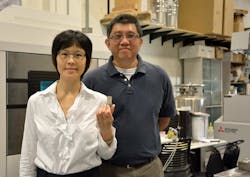Funding to improve QA in additive manufacturing of turbine components

The U.S. Department of Energy (Washington, DC), through its University Turbine Systems Research program, has awarded researchers at the University of Pittsburgh's Swanson School of Engineering (Pittsburgh, PA) with $802,400 to find an effective quality assurance method for additive manufacturing (also known as 3D printing) of gas turbine components.
The three-year project has received additional support from the University of Pittsburgh ($200,600), resulting in a total grant of $1,003,000.
Xiayun (Sharon) Zhao, Ph.D., assistant professor of mechanical engineering and materials science at the University of Pittsburgh, will lead the research, working with Albert To, associate professor of mechanical engineering and materials science at the University of Pittsburgh, and Richard W. Neu, professor in the Georgia Institute of Technology's School of Mechanical Engineering (Atlanta, GA). The research team will use machine learning to develop a cost-effective method for rapidly evaluating, either in-process or offline, the hot gas path turbine components (HGPTCs) that are created with laser powder-bed fusion (LPBF) technology, which can produce complex metal components faster and at lower cost.
"...because there's a possibility that the components will have porous defects and be prone to detrimental thermomechanical fatigue, it's critical to have a good quality assurance method before putting them to use," explains Zhao. "The quality assurance framework we are developing will immensely reduce the cost of testing and quality control and enhance confidence in adopting the LPBF process to fabricate demanding HGPTCs."
For more information, please visit engineering.pitt.edu.